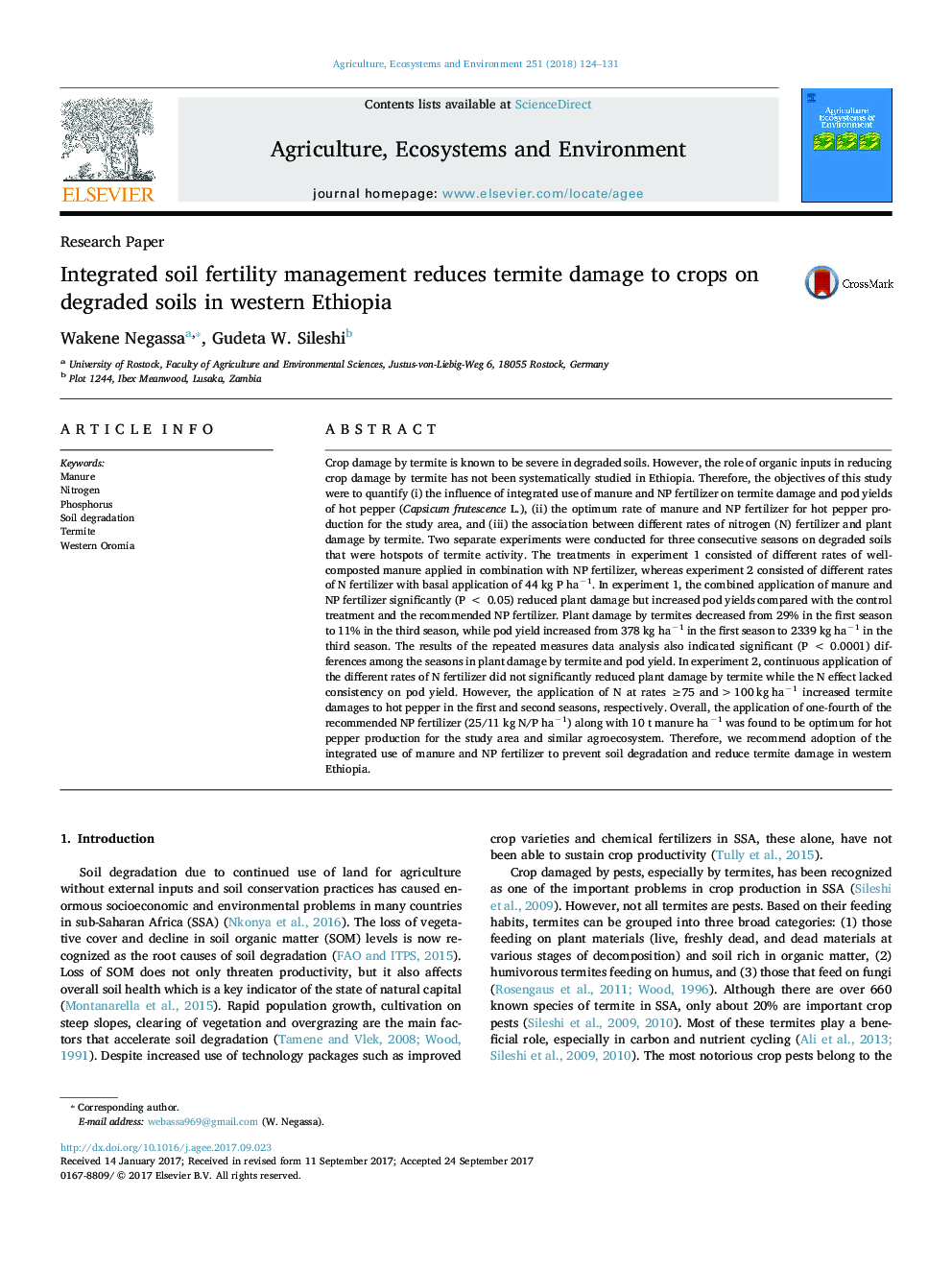| کد مقاله | کد نشریه | سال انتشار | مقاله انگلیسی | نسخه تمام متن |
|---|---|---|---|---|
| 5537781 | 1552001 | 2018 | 8 صفحه PDF | دانلود رایگان |
عنوان انگلیسی مقاله ISI
Integrated soil fertility management reduces termite damage to crops on degraded soils in western Ethiopia
ترجمه فارسی عنوان
مدیریت باروری خاک یکپارچه باعث کاهش آسیب موریانه به محصولات کشاورزی در خاک های تخریب شده در اتیوپیای غربی می شود
دانلود مقاله + سفارش ترجمه
دانلود مقاله ISI انگلیسی
رایگان برای ایرانیان
کلمات کلیدی
کود کشاورزی، نیتروژن، فسفر، تخریب خاک، موریانه، اورمیه غربی،
موضوعات مرتبط
علوم زیستی و بیوفناوری
علوم کشاورزی و بیولوژیک
علوم زراعت و اصلاح نباتات
چکیده انگلیسی
Crop damage by termite is known to be severe in degraded soils. However, the role of organic inputs in reducing crop damage by termite has not been systematically studied in Ethiopia. Therefore, the objectives of this study were to quantify (i) the influence of integrated use of manure and NP fertilizer on termite damage and pod yields of hot pepper (Capsicum frutescence L.), (ii) the optimum rate of manure and NP fertilizer for hot pepper production for the study area, and (iii) the association between different rates of nitrogen (N) fertilizer and plant damage by termite. Two separate experiments were conducted for three consecutive seasons on degraded soils that were hotspots of termite activity. The treatments in experiment 1 consisted of different rates of well-composted manure applied in combination with NP fertilizer, whereas experiment 2 consisted of different rates of N fertilizer with basal application of 44 kg P haâ1. In experiment 1, the combined application of manure and NP fertilizer significantly (P < 0.05) reduced plant damage but increased pod yields compared with the control treatment and the recommended NP fertilizer. Plant damage by termites decreased from 29% in the first season to 11% in the third season, while pod yield increased from 378 kg haâ1 in the first season to 2339 kg haâ1 in the third season. The results of the repeated measures data analysis also indicated significant (P < 0.0001) differences among the seasons in plant damage by termite and pod yield. In experiment 2, continuous application of the different rates of N fertilizer did not significantly reduced plant damage by termite while the N effect lacked consistency on pod yield. However, the application of N at rates â¥75 and >100 kg haâ1 increased termite damages to hot pepper in the first and second seasons, respectively. Overall, the application of one-fourth of the recommended NP fertilizer (25/11 kg N/P haâ1) along with 10 t manure haâ1 was found to be optimum for hot pepper production for the study area and similar agroecosystem. Therefore, we recommend adoption of the integrated use of manure and NP fertilizer to prevent soil degradation and reduce termite damage in western Ethiopia.
ناشر
Database: Elsevier - ScienceDirect (ساینس دایرکت)
Journal: Agriculture, Ecosystems & Environment - Volume 251, 1 January 2018, Pages 124-131
Journal: Agriculture, Ecosystems & Environment - Volume 251, 1 January 2018, Pages 124-131
نویسندگان
Wakene Negassa, Gudeta W. Sileshi,
